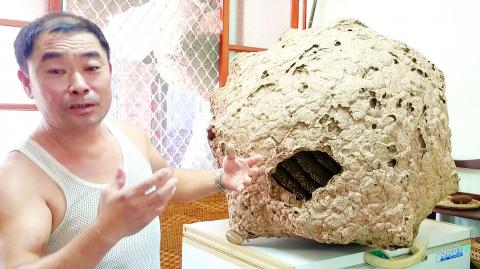A hornet nest with a diameter of 1.15m, housing about 25,000 Vespa basalis, or black-tailed tiger hornets, was removed from a mountainside property in Chiayi’s Mudan Township (牡丹) last month.
Although onlookers were fascinated by the size of the hive, Yeh Feng-yung (葉豐永), the nest removal specialist who climbed a three-story-high tree to reach it, said he was not particularly impressed.
In the current hornet nesting season, which started in August last year, he has dealt with 80 nests each containing 4,000 to 45,000 hornets, while the largest nest he ever laid hands on in his career contained about 60,000, Yeh said.

Photo: Yu Hsueh-lan, Taipei Times
He is a locally renowned expert in hornet nests with 30 years of experience, and had previously managed a Yunlin-based hornet education and training center for professionals, Yeh said.
Four out of Yeh’s eight apprentices have become hornet nest removal specialists, he said.
He grew up in the mountains and, at the age of 19, began catching hornets with a net that he had made, because he was tired of being stung, Yeh said.
“God put me here to catch hornets and gave me the skills to do it,” he said.
The profession can be painful, Yeh said, adding: “There was this time when I was stung 16 times by black tails. I drank some rice liquor for the pain, took down the nest and took it home.”
The annual season for hornets is from August to January, a period that he typically spends in the wilderness under a tent surveying and removing nests, Yeh said.
Hornet queens usually hibernate in a hole until April, producing about 100 drones, before usually leading the swarm up a tree to build a permanent nest.
August brings the crunch period to his business cycle, because only then are the nests large enough to be worth the trouble and cost of removal, he said.
By October, hornet nests reach peak population as young females mate with males, after which males die and females leave the nest, leading to a decline in the population, Yeh said.
“By January, nests are virtually devoid of chrysalises with only hornets left in them,” he added.

Taipei has once again made it to the top 100 in Oxford Economics’ Global Cities Index 2025 report, moving up five places from last year to 60. The annual index, which was published last month, evaluated 1,000 of the most populated metropolises based on five indices — economics, human capital, quality of life, environment and governance. New York maintained its top spot this year, placing first in the economics index thanks to the strength of its vibrant financial industry and economic stability. Taipei ranked 263rd in economics, 44th in human capital, 15th in quality of life, 284th for environment and 75th in governance,

Greenpeace yesterday said that it is to appeal a decision last month by the Taipei High Administrative Court to dismiss its 2021 lawsuit against the Ministry of Economic Affairs over “loose” regulations governing major corporate electricity consumers. The climate-related lawsuit — the first of its kind in Taiwan — sought to require the government to enforce higher green energy thresholds on major corporations to reduce emissions in light of climate change and an uptick in extreme weather. The suit, filed by Greenpeace East Asia, the Environmental Jurists Association and four individual plaintiffs, was dismissed on May 8 following four years of litigation. The

A former officer in China’s People’s Liberation Army (PLA) who witnessed the aftermath of the 1989 Tiananmen Square massacre has warned that Taiwan could face a similar fate if China attempts to unify the country by force. Li Xiaoming (李曉明), who was deployed to Beijing as a junior officer during the crackdown, said Taiwanese people should study the massacre carefully, because it offers a glimpse of what Beijing is willing to do to suppress dissent. “What happened in Tiananmen Square could happen in Taiwan too,” Li told CNA in a May 22 interview, ahead of the massacre’s 36th anniversary. “If Taiwanese students or

The New Taipei City Government would assist relatives of those killed or injured in last month’s car-ramming incident in Sansia District (三峽) to secure compensation, Mayor Hou You-yi (侯友宜) said yesterday, two days after the driver died in a hospital. “The city government will do its best to help the relatives of the car crash incident seek compensation,” Hou said. The mayor also said that the city’s Legal Affairs, Education and Social Welfare departments have established a joint mechanism to “provide coordinated assistance” to victims and their families. Three people were killed and 12 injured when a car plowed into schoolchildren and their